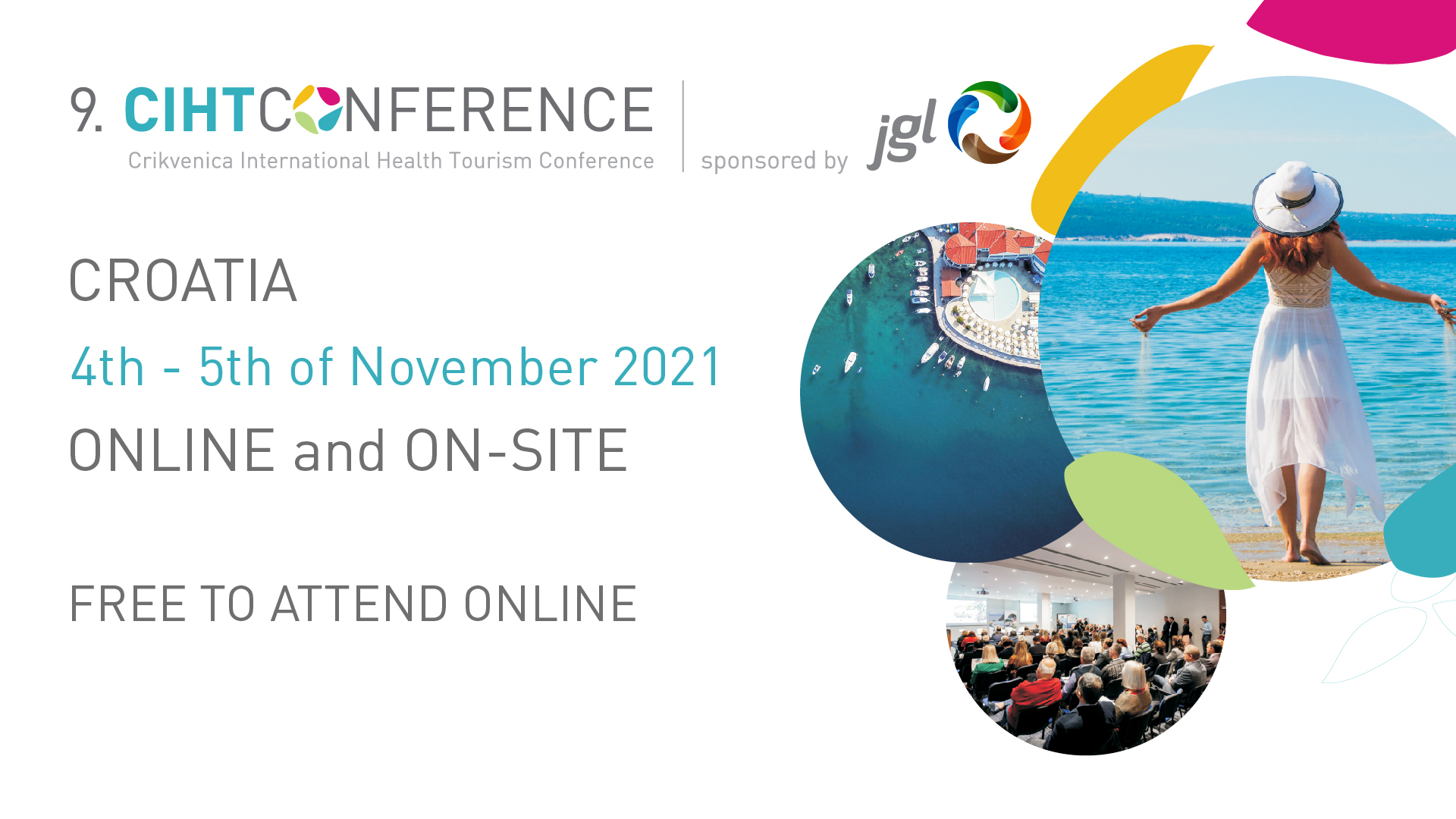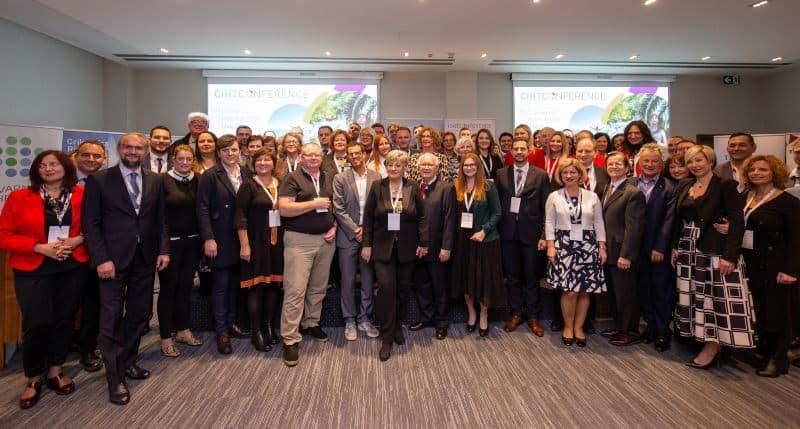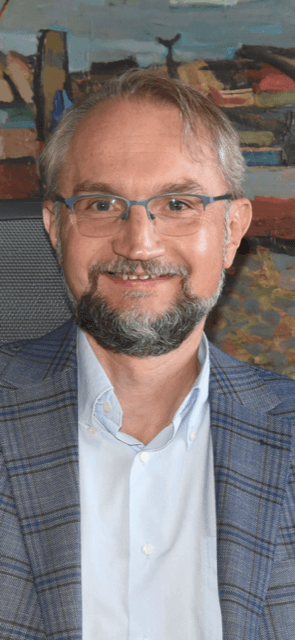November 2, 2021 - The region of Kvarner has a rich medical tourism history and has been described as 'the healing garden of Europe.' Ahead of the 9th Crikvenica International Health Travel conference, which starts on November 4, TCN catches up with the dynamic President of the Kvarner Health Tourism Cluster, Vladimir, Mozetic.
As previously reported on TCN, CIHT 2021 kicks off tomorrow at Hotel Katarina in Selce. One of the most important and prestigious health tourism conferences in the region, CIHT 2021 is the 9th edition of the conference, which is co-organised by Kvarner Health Tourism Cluster. TCN caught up with cluster president Vladimir Mozetic before the conference to find out more about the conference, health tourism in Kvarner, and the direction of Croatian medical tourism.

1. CIHT is the most relevant medical tourism conference in Croatia and is now in its 9th year. Tell us how it started, and who is the conference aimed at?
The CIHT Conference was held for the first time back in 2013 on the occasion of marking 125 years of organised health tourism on the Crikvenica Riviera, and then again in 2015 when the Kvarner Health Tourism Cluster also joined as a co-organiser.
The current form of the CIHT Conference is the result of cooperation between the Tourist Board of the City of Crikvenica and the Kvarner Health Tourism Cluster as the organiser, the Special Hospital for Medical Rehabilitation Thalassotherapy Crikvenica and the Terme Selce Polyclinic as co-organisers. The importance of the CIHT Conference has once again been recognised by many. This year, the general sponsor of the 9th CIHT Conference is Jadran-galenski laboratorij d.d., the largest Croatian pharmaceutical company which has earned global success, which is also a member of the Cluster.
Additionally, the Ministry of Tourism and Sport has supported the CIHT Conference for years, as has the Ministry of Health, Primorje-Gorski Kotar County, the Croatian National Tourist Board, the Kvarner Tourist Board, the Croatian Chamber of Commerce, Jadran d.d. Crikvenica and the City of Crikvenica.
Over more recent years, the conference has been attended by several hundred participants, and the lecturers have been eminent experts from across more than 20 countries that are global carriers of health tourism from several continents. The conference is intended for all those who are interested in the activities of organisations and their development, as well as mutual business cooperation in the field of health tourism.
2. CIHT has become known for its ability to attract fantastic international expert speakers. Give us a flavour of what we can expect at this year's event.
This year, the conference was divided into several very interesting panels with 17 outstanding speakers from 9 countries:
1) Medical Tourism From The US Perspective, which will be attended by lecturers from Cleveland Clinic, University of Cincinnati, National Institute of Cancer and Dartmouth-Hitchcock Medical Center. Comparatives and possibilities of cooperation through several areas in the health industry and health tourism will be presented,
2) Competitiveness of The Tourist Destination Through The Diversity of The Tourist Offer with several interesting topics: "Croatia - the land of opportunity", "Croatian tourism and airlines: A missed opportunity?", "Tourism and sport; the advantages of sport destinations'', ''Professional cycling team’s training camps - synergy with destination'',
3) Facilitating Medical Tourism with the topics: "Medical Tourism Stakeholder Management", "Italian Market trends and Bookingsmed", "Rident: Dental Tourism Development and New Challenges", "The Accreditation in Healthcare",
4) New Trends in Medical Tourism that will show the areas: "Fresh and local food in hospitality business - myth or reality?", "Let's Make a World of a Difference", "Game Changer in Health and Wellbeing Holistic Solutions", "Tradition" as a Trend''.
During the conference, a workshop will be held called "Destination Development in Medical Tourism", as will numerous opportunities for B2B meetings, including with 6 facilitators from Italy. Of course, a tour of the health-tourist-gastronomic offer in the region was also organised.
More information about the programme is available here, and more information on how to apply and registration fee can be found here.

3. Many visitors to Croatia are surprised to find that Croatia is a top medical tourism destination, and the Kvarner region is very much at the forefront of that quality. Tell us a little about the expertise and facilities one can find here.
A possible answer to that lies in one of the projects we're currently working on. Through our regional model, we want to present the criteria by which the region would first be determined by the Destination of Health and Quality of Life. The criteria contain many elements and are also contained in international guidelines; from water and air quality, infrastructure, food, educational processes, health industry products, healthcare quality, COVID-safe protocol quality, accommodation quality, the quality of recreational facilities… This shows the need for cooperation from and of all sectors; public, private, entrepreneurship, scientific-educational, regional and local self-government, and the civil sector. This is a model that can be gradually transferred to the national level. Let's also not forget that investing in the field of healthcare and the quality of life industry enables the raising of the quality and availability of services to our citizens at the same time.

4. The Kvarner Health Cluster is arguably a bigger brand in the medical tourism world than Croatia itself. Who are your members, and what are your core activities?
The Kvarner Health Tourism Cluster is an independent association which was founded back in November 2014. It brings together members from the healthcare sector (medical and dental), the healthcare industry, the tourism sector (tourist boards, agencies and hotel groups) and the scientific and teaching field (components of the University of Rijeka).
Currently, the Cluster has 32 members, with over 8,000 employees, of which almost 4,500 are healthcare personnel. The members are from both the private and public sectors.
With its establishment, activities were started with the aim of connecting all stakeholders in the health tourism and healthcare industry with the quality of the preparation, promotion, development and improvement of their services and products. At the same time, we wanted to take advantage of our location, as well as a large number of high-quality staff within the institutions here, and position Kvarner and the entire county as a destination of health and quality of life.
The main role of the Cluster is to promote our members and our region in the field of health tourism and the healthcare industry, and to connect our members with international partners for a better offer of health and tourism products. This is done continuously through regular participation of our members in congresses and fairs, and through written materials and by using social media.
The representatives of Cluster members actively participate in the work of the Health Tourism Association at the Croatian Chamber of Commerce, in the Association of Private Health Institutions at the Croatian Employers' Association, in working groups of the Ministries of Health, Tourism and Sports related to target areas and in working groups within the Croatian National Tourist Board with the aim of branding tourism and the health industry as significant development industries at the national level. In this way, the activities that should be competitive in the long-term, as well as the therapeutic-rehabilitation segment, both stand out.
It's certain that these services should be accompanied by tourist-accommodation capacities, as well as enabling a longer stay of health-tourist guests with the extension of the season. It's also important to educate staff in the field of health tourism, the promotion of studies in foreign languages, and the use of the results of scientific research projects in the overall offer. The additional implementation of health industry products, along with applications for EU projects are another model of development.
The Cluster is also recognised internationally, and back in 2016 it won the title of Cluster of the Year in the selection of the International Medical Travel Journal, and in 2018 and 2020 it was in the finals with the national clusters of Malaysia and South Korea, which are certainly some of the world leaders in the field of health tourism. The visibility of our region was further increased by the organisation of the IMTJ Congress in 2017 in Opatija with the participation of over 300 participants from 32 countries spanning 4 continents.
Additional information is available on the cluster website, and on social media.
5. This will be the 9th edition of CIHT. How would you define progress in the Croatian medical tourism industry over that time?
Without a doubt, the more organised approach in the implementation and promotion of the health tourism offer, as well as the legal regulation of the health tourism status that has taken place in recent years, with the involvement of national and regional institutions, and the enthusiasm of service providers have contributed to the gradual progress of the health industry. The intention of the Ministry of Tourism and Sport, and the Ministry of Health, as well as service providers, is to connect stakeholders at the level of the Republic of Croatia.
For example, it is estimated that the pre-pandemic year of 2019, more than 80,000 guests stayed in Kvarner for access to services within health tourism. The vast majority were foreign guests and they were using services in dental medicine, and then in the field of various segments of rehabilitation, and selective forms of diagnostic, therapeutic/surgical procedures. Guests from Croatia's surrounding countries, primarily Italy, continue to lead in arrivals, but there is a noticeable increase in the number of guests from Germany, Scandinavia, Great Britain and Russia. Other, more distant, markets are also now opening up. The users of services in our institutions, and thus in the region, stay according to the type of medical service they need, from one day to several weeks.
6. The pandemic obviously had a crushing effect on business last year. Are things starting to return to normal? What trends are you seeing?
Although the coronavirus pandemic slowed down planned development, the elapsed time was used to develop new programmes tailored to the needs of these new circumstances. Currently, our members offer twenty-six POSTCOVID rehabilitation programmes, which are offered to both the Croatian market and to foreign markets. The further focus of the Cluster members is directed towards the development and offer of services in preventive and personalised medicine, rehabilitation (physical and mental), so-called "Lifestyle" medicine and programmes which focus on active and healthy aging.
Although our focus is primarily on the surrounding countries (76 million people live within 500 kilometres or a five-hour driving distance, of which 14 million are over 60 years old), we also direct our propaganda towards Scandinavia, Britain, Russia and Ukraine. Research shows that currently 10 percent of EU residents use healthcare services outside of their home countries (about 50 million of them), and those who would like to do the same stand at 53 percent (about 250 million people), and this is an indication that there is no shortage of markets.
More recently, the Kvarner Health Cluster signed a cooperation agreement with the Ministry of Ayush under the Government of the Republic of India, which promotes traditional forms of medicine, yoga and Ayurveda. Communication with associates from China has also continued. We're also in contact with partners from the USA (ACAP-Association of Croatian-American Professionals), through medium-term project activities in the field of health tourism and the health industry.
7. What are the next crucial steps for the development of the Croatian medical tourism story?
Croatia still isn't sufficiently recognised as a destination for health tourism, and in addition to regional developments, the additional networking of stakeholders will be needed at the national level. The fact is that in recent years, and at the national level, there has been increased investment in the organisation, promotion and legislation in the field of health tourism.
Determining priority markets, promoting the types of services we offer, especially in those segments where we have high quality, tradition and resources, and taking advantage of natural healing factors are some of the necessary activities which need to be engaged in. In this way, the activities that should be competitive in the long run in the preventive, integrative, personalised, and therapeutic-rehabilitation segment stand out. These services should definitely be accompanied by other tourist-accommodation capacities, related non-healthcare services, while enabling the longer stay of health-tourist guests. It's also important to educate staff in the field of health tourism, and to use the results of scientific research projects in the overall offer.
The interconnection and action of all stakeholders in health tourism and the health industry, all offering something in the segment in which it is most competent, proves to be a successful model of cooperation, providing health services, promotion on the Croatian market and on foreign markets, the proper organisation of transport and accommodation, and additional non-medical activities (culture, gastronomy, "outdoor activities", "storytelling"…) and content for the service users and their accompaniment.
So, if we jointly accept the health industry, of which health tourism is a part, as a strategic industry, we can interconnect stakeholders in healthcare, the health industry, tourism, science, education and research, and the probability of a successful outcome is higher. Additional activities on destination certification, destination management, the accreditation of service providers, the use of public-private partnership, joint application for EU projects, and the use of comparative advantages and possibilities of individual subregions of Croatia will surely bring us closer to our desired goal. Together we're stronger, more recognisable, more competitive and more credible both to each other and to the end-user.
8. What would you say are the competitive advantages of Kvarner healthcare, and why should patients choose Kvarner?
What was recently published in foreign media probably best describes the comparative advantages of Kvarner and of Primorje-Gorski Kotar County as a whole: "The combination of differences, a touch of the mild climate of the coast and the islands and the fresh air of the continental areas and the sea, and wild vegetation made Kvarner the "Healing Garden of Europe".
Health tourism in our county has a long history that stretches back almost 180 years. In the past in the area of the Opatija Riviera, the first therapeutic procedures based on natural healing factors began to be carried out. In the second half of the nineteenth century, the climatic advantages of our region were recognised in the area of Crikvenica and on the island of Losinj. Opatija has since been celebrating more than 130 years since it was declared a spa city. Tradition and our geographical position are a couple of the reasons as to why health tourism is accepted in our region as one of the most important directions of development.
The spa in Veli Losinj has continued the tradition of providing health services to guests from abroad. The "Terme Selce" polyclinic has been actively present in this area for more than 30 years, and the institutions that provide dental services have been achieving high-quality results for about 20 years now. For many years, most institutions have been continuously investing significant funds in their staff, equipment and premises, as well as in promoting their own services across emitting markets. Top-quality service with an optimal price, and excellent transport connections by land and air are the main reasons for competitiveness.
Marking the health industry, of which health tourism is an important part, as an economic activity of the so-called "smart specialisations" of our region have created quality preconditions for the inclusion of a larger number of business entities, the creation of newly created value and jobs, and the further improvement of service quality for the local population.
For more details about CIHT 2021, visit the official website.
For more details about the destination, check out the TC Crikvenica in a Page guide.


